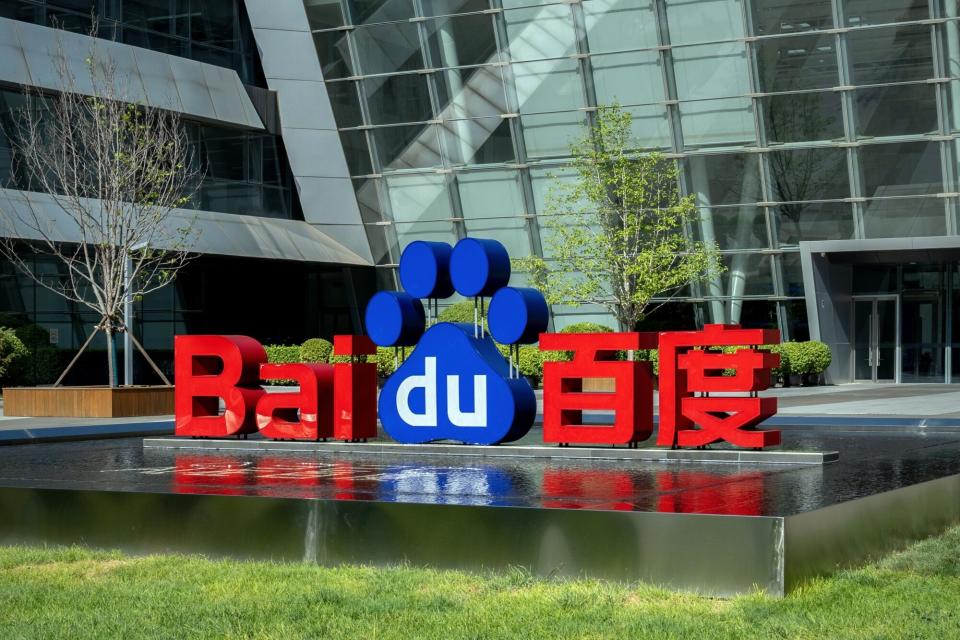Baidu Slides Most Since 2022 After AI Spending Erodes Profit

(Bloomberg) -- Baidu Inc.’s shares slid their most since October 2022 after reporting a 48% plunge in profit, underscoring the growing costs of training and developing AI to fend off challengers in the burgeoning arena.
Most Read from Bloomberg
Tech Giants Drag Down US Stocks After Torrid Rally: Markets Wrap
Gold Climbs to Record on Mix of Fed Pivot and Geopolitical Risks
Bitcoin Retreats After Record-Setting Run That Topped $69,000
The company reported a December-quarter net income of 2.6 billion yuan ($361 million) that missed projections, though much of that stemmed from a loss from equity accounting for preferred shares. It overshadowed a 6% rise in revenue after Baidu’s ChatGPT-style service began to augment advertising sales, helping the Chinese AI leader weather a severe economic downturn. Its shares slid more than 8% in New York.
Baidu’s results follow disappointing numbers from Alibaba Group Holding Ltd., underscoring how the private sector that once drove the world’s No. 2 economy has run out of steam. The mixed performance underscored the challenges facing a company that once routinely chalked up double-digit percentage growth but is now grappling with macro and market uncertainty.
To rekindle the business, Baidu has joined Silicon Valley peers from Microsoft Corp. to Google in seeking ways to monetize generative AI. The Chinese company has attracted more than 100 million users to its ChatGPT-style service — now including a premium tier that charges a monthly subscription — giving it a headstart against peers like Tencent Holdings Ltd. and ByteDance Ltd.
But revenue generated by the AI model known as Ernie is a drop in the bucket for Baidu, which still relies mainly on search ads. Ernie will contribute “several billion yuan” of additional revenue through advertising and cloud services in 2024, billionaire founder Robin Li told analysts on a conference call, up from several hundred million yuan in the December quarter. Revenue from Baidu’s pivotal cloud arm grew 11% to 5.7 billion yuan in the quarter, executives said.
Still, research and development costs climbed 11% last quarter, reflecting fees for servers to support generative AI development. On that front, Li said Baidu should have enough high-end training chips on hand to support Ernie’s advancements over the next one to two years.
The founder previously warned against China’s so-called “war of a hundred models,” where big tech firms and venture investors alike pour billions of dollars into startups building AI platforms from scratch — many of them leveraging the same open-source code. Baidu is instead pitching local developers to create AI-native applications atop Ernie, including by doling out $140 million to fund such projects.
If successful, Ernie could put Baidu at the core of an AI ecosystem similar to what the GPT Store is to OpenAI. But its long-time rivals Tencent and Alibaba are also vying for what’s likely a winner-takes-all market, as both firms command bigger warchests and user pools thanks to super-apps like WeChat and Taobao.
What Bloomberg Intelligence Says
Baidu’s 4Q profit beat expectations on better cost control, though AI-related losses deepened, highlighting the continued growth challenge. Adjusted profit in Baidu Core fell 7.1% sequentially, with a 260-bp decrease in margin to 22.5%, despite a rising top-line contribution from ERNIE-Bot. The margin drop suggests that ERNIE-Bot remains unprofitable in spite of a 4.7% annual rise in “other sales.”
Robert Lea, analyst
Click here for the research.
Near-term, Baidu still counts on advertising as its bread and butter — and that doesn’t bode well during a downturn. The world’s No. 2 economy is grappling with a property slump and deflation, forcing Chinese leaders to resort to wide-ranging policies including rate cuts and direct fund injections to boost investor confidence.
Revenue from Baidu’s core businesses including online marketing and the cloud met analysts’ expectations during the December quarter. Its streaming offshoot IQiyi Inc. barely grew its topline after losing some paid subscribers, but profitability continued to improve.
Once the runaway leader in desktop search, Baidu has over the years tried to adapt its business to the mobile era, albeit with mixed success. In January, the Beijing-based company walked away from a $3.6 billion deal to acquire Joyy Inc.’s streaming service YY, citing the lack of regulatory approval.
Its shares have dropped roughly 30% since July in Hong Kong, underperforming peers as the high costs of AI development compound investor concerns over the weak economy.
Read More: Alibaba’s New CEO Elevates AI to Top Priority in Revamp
--With assistance from Debby Wu.
Most Read from Bloomberg Businessweek
Humanoid Robots at Amazon Provide Glimpse of an Automated Workplace
Immigration Rage Drowns Out the US Labor Market’s Need for Workers
The Monaco Royals Whose Deals Have Brought Peril to the Palace Doors
©2024 Bloomberg L.P.
